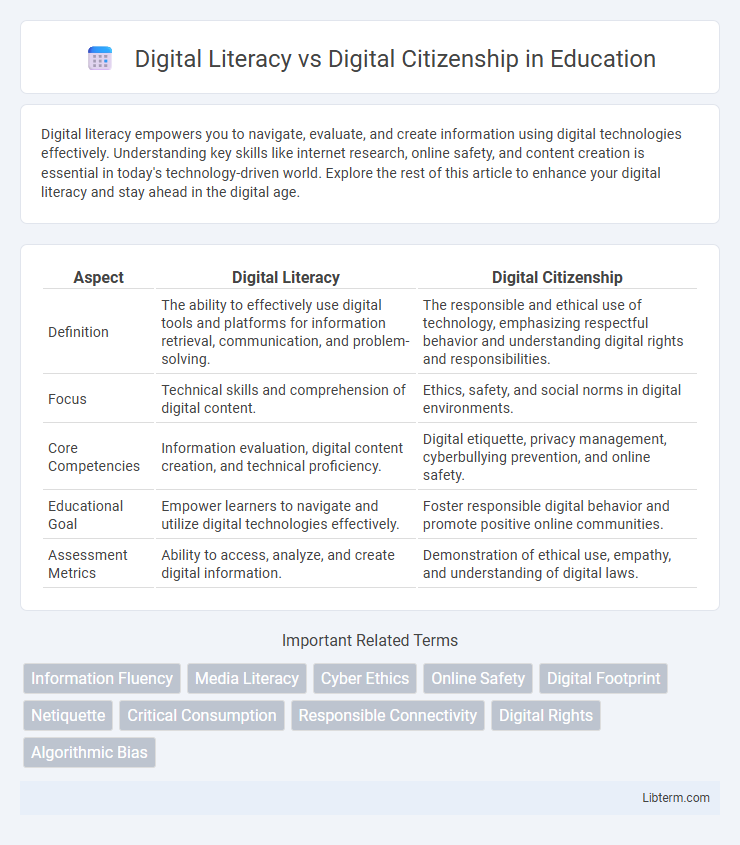Digital literacy empowers you to navigate, evaluate, and create information using digital technologies effectively. Understanding key skills like internet research, online safety, and content creation is essential in today's technology-driven world. Explore the rest of this article to enhance your digital literacy and stay ahead in the digital age.
Table of Comparison
| Aspect | Digital Literacy | Digital Citizenship |
|---|---|---|
| Definition | The ability to effectively use digital tools and platforms for information retrieval, communication, and problem-solving. | The responsible and ethical use of technology, emphasizing respectful behavior and understanding digital rights and responsibilities. |
| Focus | Technical skills and comprehension of digital content. | Ethics, safety, and social norms in digital environments. |
| Core Competencies | Information evaluation, digital content creation, and technical proficiency. | Digital etiquette, privacy management, cyberbullying prevention, and online safety. |
| Educational Goal | Empower learners to navigate and utilize digital technologies effectively. | Foster responsible digital behavior and promote positive online communities. |
| Assessment Metrics | Ability to access, analyze, and create digital information. | Demonstration of ethical use, empathy, and understanding of digital laws. |
Understanding Digital Literacy
Understanding digital literacy involves mastering skills to effectively find, evaluate, and communicate information through digital platforms, enabling critical thinking and problem-solving in online environments. Digital literacy encompasses technical abilities such as using software, navigating the internet, and understanding digital tools essential for personal and professional growth. This foundation supports responsible digital citizenship, which emphasizes ethical behavior, online safety, and active participation in digital communities.
Defining Digital Citizenship
Digital citizenship encompasses the responsible and ethical use of technology, including understanding online safety, privacy, and digital etiquette. It extends beyond digital literacy by promoting active participation in digital communities while respecting others' rights and fostering positive online behavior. Developing strong digital citizenship skills is essential for navigating the complexities of the internet and contributing constructively to society.
Key Differences Between Digital Literacy and Digital Citizenship
Digital literacy involves the ability to effectively find, evaluate, and create information using digital technologies, emphasizing skills like critical thinking, online research, and technical proficiency. Digital citizenship centers on the responsible and ethical use of digital tools, covering online safety, privacy, digital etiquette, and understanding digital rights and responsibilities. The key difference lies in digital literacy focusing on skill acquisition and comprehension of digital content, while digital citizenship emphasizes ethical behavior and participation within digital communities.
The Importance of Digital Skills in the Modern World
Mastering digital literacy equips individuals with essential skills to navigate, evaluate, and create information safely and effectively in an increasingly digital society. Digital citizenship emphasizes responsible and ethical behavior online, promoting awareness of cyber security, privacy, and respectful communication. Together, these competencies ensure that people not only use technology proficiently but also contribute positively to the digital community.
Ethical Responsibilities Online
Digital literacy encompasses the skills and knowledge required to effectively navigate and evaluate online content, while digital citizenship involves responsible and ethical behavior in digital environments. Ethical responsibilities online include respecting privacy, avoiding cyberbullying, protecting intellectual property, and ensuring truthful communication. Practicing strong digital citizenship fosters a safer, more inclusive digital community where users uphold integrity and accountability.
Navigating Information and Misinformation
Digital literacy equips individuals to critically evaluate online content, distinguishing credible sources from misinformation by analyzing authorship, evidence, and bias. Digital citizenship emphasizes responsible participation in digital spaces, fostering ethical sharing and reporting of false information to maintain a trustworthy online environment. Together, these skills empower users to navigate complex information ecosystems with discernment and accountability.
Building a Positive Digital Footprint
Building a positive digital footprint involves practicing responsible online behavior and understanding the impact of digital actions on one's reputation. Digital literacy equips individuals with the skills to navigate, evaluate, and create information safely, while digital citizenship emphasizes ethical use, respect, and accountability in online communities. Together, these concepts foster a trustworthy and constructive digital presence that supports personal and professional growth.
Cybersecurity and Safe Online Practices
Digital literacy encompasses the skills required to effectively navigate, evaluate, and create information using digital technologies, emphasizing critical understanding of cybersecurity threats such as phishing, malware, and data breaches. Digital citizenship extends this knowledge to responsible and ethical online behavior, advocating for safe online practices including privacy management, secure password usage, and awareness of digital footprints. Mastery of both concepts is crucial for protecting personal information and fostering a secure digital environment.
Teaching Digital Competencies in Education
Teaching digital competencies in education requires integrating both digital literacy and digital citizenship to equip students with essential skills for navigating technology responsibly and effectively. Digital literacy emphasizes the ability to find, evaluate, and create digital content, while digital citizenship focuses on understanding online ethics, safety, and responsible behavior. Combining these elements fosters critical thinking, cyber safety awareness, and ethical use of digital tools, ensuring students become proficient and conscientious digital participants.
The Future of Digital Engagement and Inclusion
Digital literacy equips individuals with essential skills to navigate, evaluate, and create information using digital technologies, serving as the foundation for meaningful digital participation. Digital citizenship extends beyond literacy, emphasizing responsible behavior, ethical use, and active engagement in online communities to foster inclusive, safe, and equitable digital environments. The future of digital engagement and inclusion depends on integrating robust digital literacy programs with comprehensive digital citizenship education to empower diverse populations and bridge the digital divide globally.
Digital Literacy Infographic

 libterm.com
libterm.com